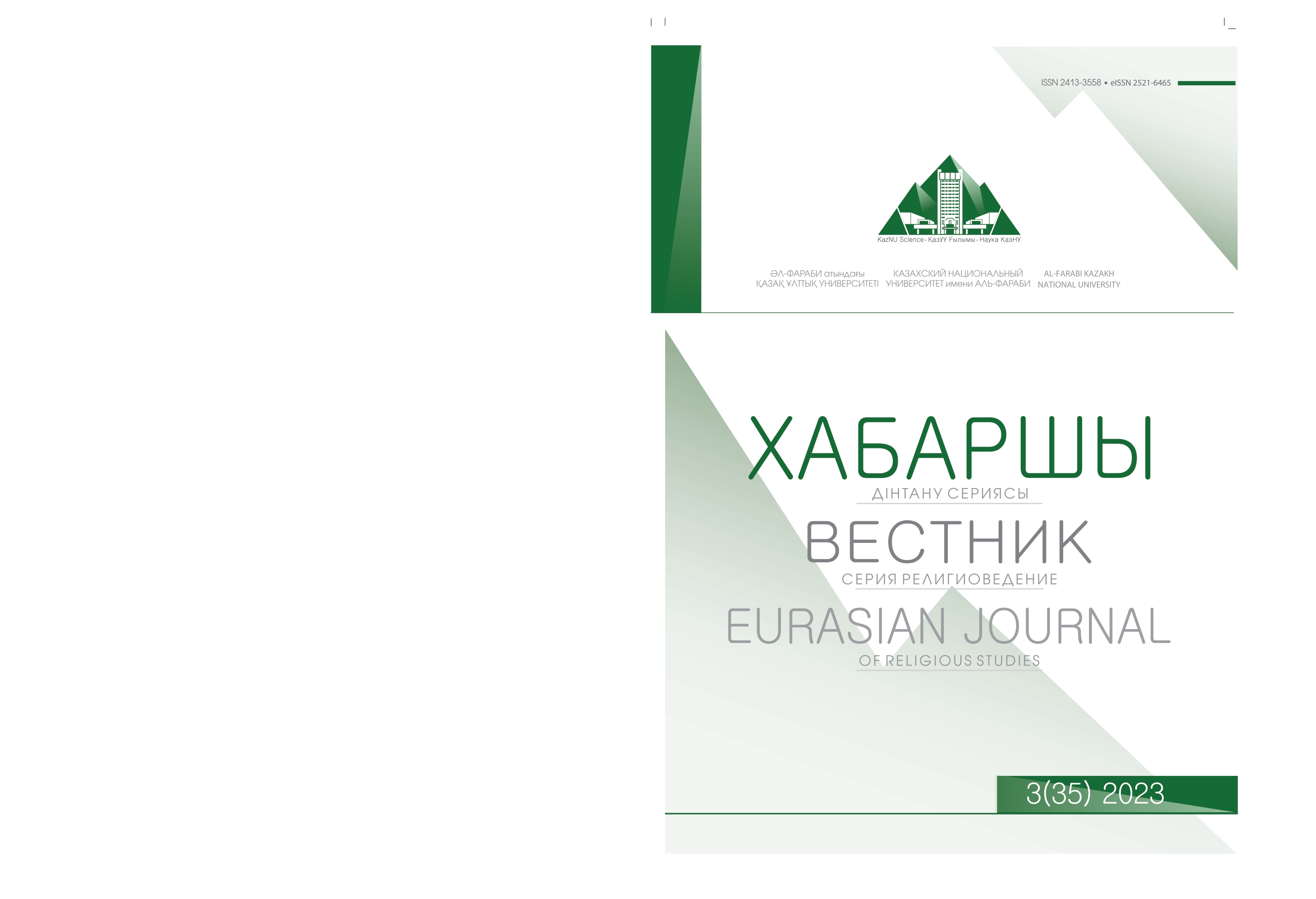Ulema in the period of Stalinist and Bolshevik Repressions in Kazakhstan: the fate of Aliyasqar Aytqozhauly
DOI:
https://doi.org/10.26577//EJRS.2023.v35.i3.r2Keywords:
Islam, Ulama, the Soviet Union, repressive policy, rehabilitationAbstract
The article is devoted to the analysis of the biography of the representative of Kazakh ulemas during the period of the Soviet authority repressions in Kazakhstan. The consequences of the repression were a physical destruction of a large group of local Muslim leaders, a great damage to Islamic education, as well as to the functioning of Muslim communities in Kazakhstan as a whole. The purpose of this article is to show repressions against ulemas through the fate of Aliyasqar Aytqozhauly as an alim from Kokshetau, whose name was included in the “Biographies of the Islamic Scholars of Our Times” by Sadwaqas Ghilmani. As a methodological basis, the authors applied the micro-historical approach and the biographical method, allowing to study the repressive policy of the Soviet state in 1920s-1930s through the prism of people's lives and micro-events and, accordingly, “ to hear the voice of Muslims” themselves, who experienced the pressure of the repressive machine. In order to present a coherent and whole view of the events, the article shows the activity of the different actors, particularly Muslim clergy representing different projects of development of Islam and Islamic education, the Central Spiritual Directorate of Muslims of Inner Russia and Siberia (SSAM), which coordinated work of clergy in most Kazakhstani regions, the Soviet state and its repressive bodies such as the USPA/NCIA. The source base of the study includes information about the alim in the “Biographies of the Islamic Scholars of Our Times” by Sadwaqas Ghilmani as well as archival materials. The reconstruction of biographies of local ulema in Kazakhstan, the actualization of their names and activities, is an important contribution to the process of their full rehabilitation, as well as to overcoming "white spots" and gaps in the history of Islam, the restoration of the historical process continuum and its comprehension.
Key words: Islam, ulama, the Soviet state, repressive policy, rehabilitation.
References
Ахмадуллин В.А. (2020) Деятельность советского государства и духовных управлений мусульман по развитию исламского образования и просвещения (1944-1965). – Москва: ИД «Читай». ИД «Марджани». – 275.
Ғылмани, C. (2015) Заманамызда болған ғұламалардың ғұмыр тарихтары. – Алматы: Дайк-Пресс. – 400.
Муминов, А., Утепбергенова, У. (2019) Акмолинская школа в исламских науках//Проблемы исламоведения и арабской филологии. Материалы международной научно-практической конференции. – Алматы: «Нұр-Мүбарак» баспасы. – 27-37.
Специализированный государственный архив Управления информатизации и связи Департамента полиции Акмолинской области (СГА УИС ДП Акмолинской области).
Специализированный государственный архив Управления информатизации и связи Департамента полиции Северо-Казахстанской области (СГА УИС ДП Северо-Казахстанской области).
References
Akhmadullin V.A. Deiatelnost sovetskogo gosudarstva i dukhovnykh upravleniĭ musulman po razvitiiu islamskogo obrazovaniia i prosveshcheniia (1944-1965) [The Activity of the Soviet State and Spiritual Administrations of Muslims for Development of Islamic Education and Training (1944-1965)]. – Moskva: ID «Chitai». ID «Mardzhani». – 275. (in Russian)
Bekkin, R. (2017) The Muftiates and the State in the Soviet Time: The Evolution of Relationship. Islam in Russia during today`s transformation processes: New Challenges and development trends in the 21st century, edited by Z.R. Khabibullina. – Ufa: Dialog. – 54-76.
Bennigsen, A. Wimbush, Enders S. (1985) Mystics and Commissars. Sufism in Soviet Union. – Berkerley and Los Angeles: University of Caliphornia press. – 195.
Frank, A.J. (2012) Bukhara and the Muslims of Russia. Sufism, Education, and the Paradox of Islamic Prestige. – Leiden&Boston: Brill. – 216.
Ghilmani, S. (2015) Zamanamyzda bolgan g`ulamalardyn` g`umyr tarihtary [Biographies of The Islamic Scholars of Our Times]. – Almaty: Daik-Press. – 400. (in Kazakh)
Keller, Sh. (2001) To Moscow, Not Mecca. The Soviet Campaign against Islam in Central Asia, 1917-1941. – London: Praeger. – 277.
Kemper, M. (2017) From 1917 to 1937: The Mufti, the Turkologist, and Stalin`s terror”. Die welt des Islams, 57: 162-197. https://doi.org/10.1163/15700607-00572p02
Khalid, A. (2007a) Islam after Communism: Religion and Politics in Central Asia. – Berkeley: University of California Press. – 241.
Khalid, A. (2007b) The Fascination of Revolution: Central Asian Intellectuals, 1917-1927. Empire, Islam and Politics in Central Eurasia, edited by T. Uyama. – Hokkaido: Slavic Research Center. – 137-152.
Khalid, A. (2008) Searching for Muslim Voices in Post-Soviet Archives. Ab Imperio, 4:302-312. https://doi.org/10.1353/imp.2008.0139
Muminov, A. (2007) Fundamentalist Challenges to Local Islam Traditions in Soviet and Post-Soviet Central Asia. Empire, Islam and Politics in Central Eurasia, edited by T. Uyama. – Hokkaido: Slavic Research Center. – 249-261.
Muminov, A., Utepbergenova, U. (2019) Akmolinskaja shkola v islamskih naukah//Problemy islamovedenija i arabskoj filologii. Materialy mezhdunarodnoj nauchno-prakticheskoj konferencii [Akmola School in Islamic Sciences // Problems of Islamic Studies and Arabic Philology. Materials of the international scientific-practical conference]. – Almaty: "Nur-Mubarak" Press. – 27-37. (in Russian)
Ro’i, Y., Wainer, A. (2009) Muslim Identity and Islamic Practice in post-Soviet Central Asia. Central Asian Survey, 3 (28): 303-322. https://doi.org/10.1080/02634930903421863
Sartori, P. (2010) Towards a History of the Muslims’ Soviet Union: A View from Central Asia. Die Welt des Islams, 50: 315–334.
SGA UIS DP Akmolinskoi oblasti – Spetsializirovannyi gosudarstvennyi arkhiv Upravleniia informatizatsii i sviazi Departamenta polisii Akmolinskoi oblasti. (in Russian)
SGA UIS DP SKO - Spetsializirovannyi gosudarstvennyi arkhiv Upravleniia informatizatsii i sviazi Departamenta polisii Severo-Kazakhstanskoĭ oblasti. (in Russian)
Tasar, E. (2016) The Official Madrasas of Soviet Uzbekistan. Journal of the Economic and Social History of the Orient, 59: 265-302. http://dx.doi.org/10.1163/15685209-12341399
Tasar, E. (2017) Soviet and Muslims. The Institutionalization of Islam in Central Asia, 1943- 1991. – New York: Oxford University Press. – 416.













